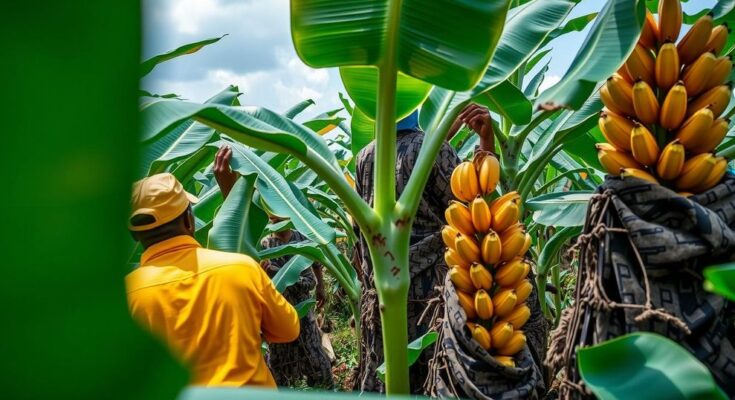In Uganda, smallholder banana farmers like Ahumwire Justine face increasing threats from extreme weather due to climate change, leading to initiatives such as a new insurance model via the NDC Action Project. This program integrates technology to facilitate rapid claims processes and enhance farmers’ resilience, securing their livelihoods amidst unpredictable environmental changes. Plans are set to expand this model to 50,000 farmers, reinforcing the importance of such innovations in addressing climate challenges.
In Uganda’s Shuku region, banana farmer Ahumwire Justine faced a catastrophic storm last October that devastated her crops and livestock, revealing the vulnerability of smallholder farmers to extreme weather events. With 300 banana trees destroyed and two cows lost, Justine and her family contemplated abandoning their uninsured two-hectare farm. “We had no food, no money for school fees for my children and no food for my animals,” Justine explained. This increasing frequency of severe weather is attributed to climate change, as noted by the Intergovernmental Panel on Climate Change. In an effort to support farmers like Justine, the NDC Action Project, a collaborative initiative involving the United Nations Environment Programme (UNEP) and the UNEP Copenhagen Climate Centre, is introducing a new type of insurance mechanism aimed at enhancing resilience against climate-related disasters. Mirey Atallah, Chief of the Adaptation and Resilience Branch in UNEP’s Climate Change Division, stated, “We know farmers, particularly smallholders, are struggling to adapt to the effects of the climate crisis. That is why projects that combine technical and financial instruments such as these are so important. They increase resilience and ensure that extreme weather does not have to be catastrophic for farmers.” Bananas are crucial to Uganda’s economy, engaging 47 percent of farmers in their cultivation. The multifaceted utility of bananas extends beyond a food source to include fiber for making ropes and leaves for various purposes. However, unpredictable weather patterns in Uganda have left farmers anxious about their future, with patterns of prolonged rainfall followed by extended droughts becoming increasingly common. “We could have two years of non-stop rain, and then six months with no rain at all,” remarked Florence Muranga, Director of the Banana Industrial Research and Development Centre, highlighting the severe risk farmers face daily. The Banana Industrial Research and Development Centre has been pivotal in UNEP’s efforts to facilitate access to crop insurance for banana farmers. Initial training of 930 farmers on smartphone usage to capture images of their crops allowed for swift assessments of storm damage through a digital platform, assisted by agroeconomists. Nearly half of these farmers are women, and the technology proved accessible despite many lacking prior experience with smartphones, as “Champion farmers” educated their peers. Another partner, Agriculture and Climate Risk Enterprise Africa, connects farmers to insurers through Agro Consortium Limited, a coalition of 13 insurance companies. The integration of insurance with a digital framework streamlines the claims process, reducing the need for in-person inspections and thereby lowering insurance costs for farmers. This initiative also includes training in water management and agroforestry, which has significantly enhanced productivity and reduced climate-related losses. Consequently, the reduced risk for insurers facilitates easier access to loans for farmers. Following the success of this pilot project, plans are underway to expand coverage to all 5,000 farmers represented by the Banana Industrial Research and Development Centre, with a long-term goal of reaching 50,000 farmers across Uganda. For farmers like Justine, this insurance program symbolizes more than mere financial support—it provides a sense of security and hope. “I know that if [my crops get damaged] I have help. It is not like in other years, where I would have to start from zero,” she expressed. The UNEP’s broader initiative aligns with the Paris Agreement’s target to limit global temperature rise, proposing sector-specific strategies to mitigate emissions while promoting sustainability in climate-sensitive economies such as agriculture. In conclusion, the innovative insurance model being piloted in Uganda stands as a vital intervention in the face of the escalating climate crisis, offering smallholder banana farmers a necessary safety net and empowering them to maintain their livelihoods amidst unpredictable weather conditions. This project not only addresses immediate risks but also fosters long-term agricultural resilience essential for the future of Uganda’s farming community.
Climate change has increasingly intensified weather patterns affecting agriculture, particularly in vulnerable regions like Uganda. The country’s banana sector is vital to its economy, with millions of farmers relying on this crop for subsistence and economic stability. As extreme weather becomes more common, innovative solutions are necessary to safeguard farmers’ livelihoods. The NDC Action Project strives to ensure these farmers can adapt to climate-related challenges through new insurance models that incorporate technology and financial support.
The pilot insurance program for Uganda’s banana farmers represents a crucial advancement in climate adaptation strategies, providing both immediate relief and a framework for sustainable agricultural practice in the face of climate unpredictability. By equipping farmers with technology and resources, this initiative not only alleviates the immediate financial burden from climate impacts but also strengthens the entire community’s resilience against future environmental challenges.
Original Source: www.unenvironment.org




